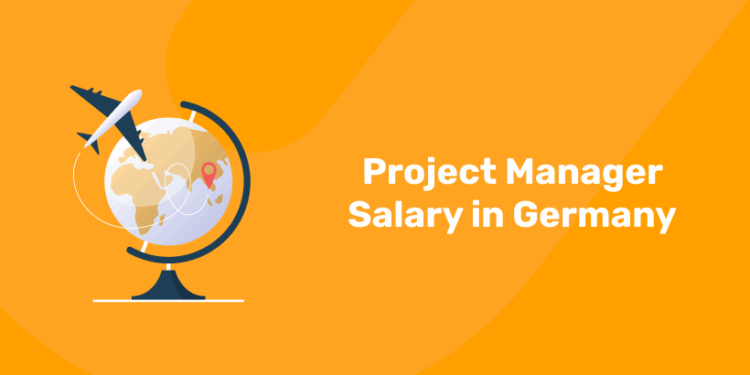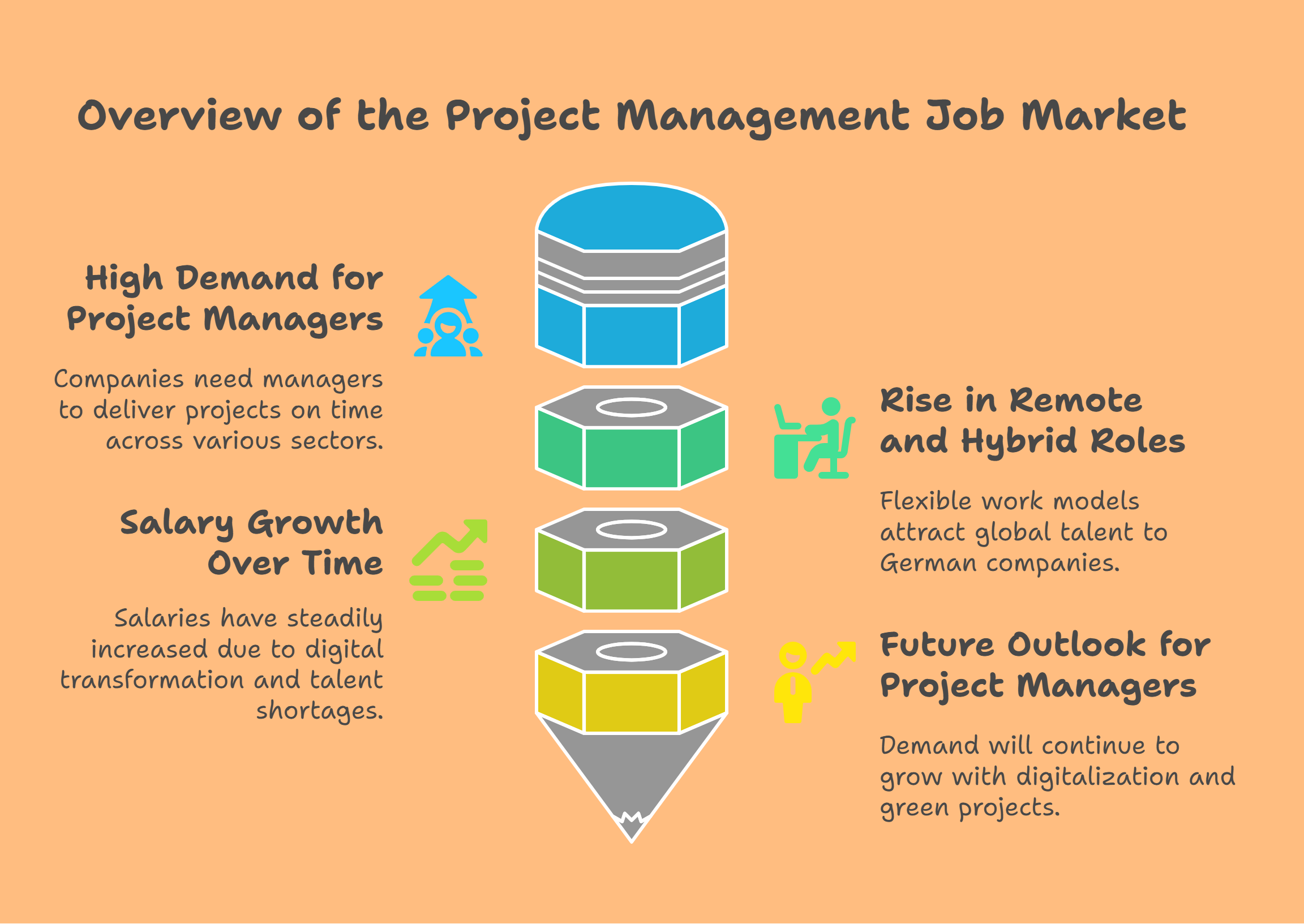Table of Contents
Germany is known for its structured and efficient work culture. Many professionals are exploring roles with strong career potential. One of the most searched topics today is Project Manager Salary in Germany. This role is vital in tech, construction, and finance sectors. With experience and the right skills, salaries can be impressive. Many cities offer competitive pay and excellent living standards. Certifications like PMP further boost your earning potential. If you’re planning to work in Germany, this guide helps.
Project management offers strong income and long-term growth. The demand for skilled project managers is increasing yearly. Salaries vary based on industry, location, and experience. Germany has opportunities for both local and global talent. This blog gives you updated salary insights and tips. From Berlin to Munich, each city offers something different. Let’s explore what you can earn as a project manager.
Master the German Language with Entri App! Click Here for Free Trial Class!
Project Manager Salary in Germany: Introduction
Project management is key to Germany’s economic success. It drives productivity, innovation, and smooth project execution. From engineering to IT, every industry relies on project managers. They ensure goals are met on time and within budget. Because of this, project managers are in high demand. They enjoy strong career growth and attractive compensation packages. If you’re considering this path, Germany is a great choice.
This blog explains everything about Project Manager salaries in Germany. You’ll learn about average and median salaries in 2025. We’ll explore how experience, location, and industry affect pay. We’ll also look at the impact of education and certifications.
A Project Manager in Germany earns €64,400–€64,500 on average. Median pay is slightly lower but still highly competitive. Salaries are not fixed and change based on many factors. Your city, skills, and company type all influence earnings. Understanding these details helps you plan your career better.
This guide will break down salaries in a clear way. Let’s explore what you can expect in today’s job market. Use this information to boost your opportunities in Germany.
Understanding the Average Project Manager Salary in Germany
1: How do you say "Good Morning" in German?
Project Manager salaries in Germany vary by many factors. Knowing both average and median figures gives better clarity. Let’s break down what these numbers really mean in 2025.
Average vs. Median Salary
-
Average Salary
-
Total salary sum divided by number of employees.
-
Can be skewed by very high or low salaries.
-
-
Median Salary
-
The middle value in a list of salaries.
-
More accurate when salary extremes exist.
-
Better reflects what most people actually earn.
-
Salary Data for 2025
| Metric | Salary (Per Year) |
|---|---|
| Average Salary | €64,400 – €64,500 |
| Median Salary | €61,000 – €63,000 |
General Salary Range in Germany
Most Project Manager salaries fall within this range:
| Level | Salary Range (€) |
|---|---|
| General | €47,500 – €85,000 |
Quick Look: 2025 Salary Snapshot
| Experience Level | Salary Range (€) |
|---|---|
| Entry-Level | €39,000 – €58,000 |
| Mid-Career | €65,000 – €83,000 |
| Senior-Level | €100,000 – €120,000 |
-
Experience and seniority level
-
City and regional cost of living
-
Industry and company size
-
Certifications like PMP or PRINCE2
-
Skills and software expertise
Lets discuss this in detail in the next section.
Free German A1 Mock Tests – Powered by AI!
Test your skills on our interactive platform. Get instant feedback from our AI to help you communicate better and track your progress. Start your free German mock test now.
Test Your German A1 for FreeFactors Influencing Project Manager Salaries in Germany
Project Manager salaries depend on many key factors. Your experience, location, and industry play a major role. Education, certifications, and skills also affect your earnings. Let’s break down these important salary influencers in detail.
Experience Level
Salaries rise with more years in the field.
Entry-Level (0–3 years)
-
Just starting a project management career.
-
Learning tools, handling small tasks, gaining trust.
-
Salary range: €39,000 – €58,000
Mid-Career (5–10 years)
-
Leads full projects and teams independently.
-
Manages timelines, risks, and cross-functional teams.
-
Salary range: €65,000 – €83,000
Senior-Level (10+ years)
-
Oversees multiple projects and strategic planning.
-
High leadership responsibility, often across regions.
-
Salary range: €100,000 – €120,000+
Location (City-Specific Salaries)
Big cities often offer higher salaries due to demand. Cost of living also impacts compensation across regions.
| City | Average Salary (€/Year) |
|---|---|
| Berlin | €75,000 – €111,215 (IT PM) |
| Munich | €97,262 |
| Frankfurt | €85,000 – €115,233 |
| Hamburg | €70,000 – €85,000 |
| Cologne | €65,000 – €80,000 |
Smaller cities may offer less but lower living costs. Top cities attract global talent with strong salary packages.
Industry
Each industry pays differently based on demand and budget.
IT & Tech
-
Fast growth, high demand for digital project managers.
-
Salary range: €66,000 – €100,000+
Construction
-
Strong growth due to infrastructure and housing projects.
-
Salary range: €65,000 – €80,000
Other Sectors
-
Finance: High bonuses and structured roles.
-
Healthcare: Growing need for project efficiency.
-
Automotive: Focus on R&D and digital transition.
-
Renewable Energy: Emerging roles with solid pay.
Education & Certifications
Certifications and degrees can boost your salary significantly.
-
PMP Certification
-
Globally valued, proves advanced project management skills.
-
In Germany, PMP holders earn around US$99,512.
-
PMP holders earn about 33% more globally.
-
-
Other Certifications
-
PRINCE2, Agile, CSM also add value.
-
Employers value updated and proven skill sets.
-
-
Higher Education
-
A Master’s or MBA often leads to promotions.
-
Especially useful for senior or multinational roles.
-
Company Size & Type
Large firms often pay more and offer added perks.
-
Big Corporations
-
Higher budgets, structured pay scales.
-
Perks include bonuses, relocation, and insurance.
-
-
Startups & SMEs
-
May offer lower pay but flexible work culture.
-
Great for learning and quick role growth.
-
Skills (Soft & Hard)
Strong skills help boost both salary and job performance.
Soft Skills
-
Leadership and Team Management
-
Guides teams, sets goals, and drives project success.
-
-
Effective Communication
-
Shares updates clearly with clients and stakeholders.
-
Hard Skills
-
Project Management Tools
-
Proficiency in JIRA, MS Project, or Asana is valued.
-
-
Budgeting and Risk Management
-
Manages resources, controls costs, and minimizes risks.
-
Each factor helps shape your overall salary potential. In the next section, we’ll explore salary trends and outlook.
Salary Trends and Outlook for Project Managers in Germany
Project management is evolving across all industries in Germany. Salaries are rising due to strong demand and specialization. Let’s explore the trends, market outlook, and future opportunities.
Current Job Market Situation
-
High Demand for Project Managers
-
Companies need managers to deliver projects on time.
-
Demand exists in IT, healthcare, energy, and finance.
-
Skilled professionals enjoy better job security and growth.
-
-
Rise in Remote and Hybrid Roles
-
Many roles offer flexible or hybrid work models.
-
Remote options attract global talent to German companies.
-
Salary Growth Over Time
-
Salaries have steadily increased in the last five years.
-
Digital transformation boosts demand for tech-savvy managers.
-
Sectors like IT and green energy show rapid growth.
-
Entry-level salaries also increased due to talent shortages.
| Year | Average Salary (€) |
|---|---|
| 2021 | €59,000 |
| 2023 | €62,500 |
| 2025 | €64,400 – €64,500 |
-
Demand Will Continue to Grow
-
Digitalization will increase project complexity and scope.
-
AI and automation projects will require experienced leaders.
-
-
Green and Infrastructure Projects Rising
-
Germany’s energy transition needs skilled project managers.
-
Large infrastructure upgrades will create more PM roles.
-
-
Higher Pay for Specialized Roles
-
Niche industries offer better pay and faster promotions.
-
IT, finance, and renewable sectors are top salary drivers.
-
Germany offers long-term opportunities for skilled project managers. The future looks stable, promising, and full of potential.
Master the German Language with Entri App! Click Here for Free Trial Class!
Negotiating Your Project Manager Salary in Germany
Salary negotiation is an important part of career growth. In Germany, preparation and confidence can boost your offer.
Let’s look at some tips and factors to consider.
Do Your Research
-
Know the Market Range
-
Understand typical salaries for your experience and industry.
-
Use data from job portals and salary reports.
-
-
Understand Regional Differences
-
Cities like Munich and Frankfurt pay more than others.
-
Match your expectations with the city’s cost of living.
-
Highlight Your Value
-
Showcase Your Experience
-
Mention project size, team managed, and key wins.
-
Share how you delivered results under tight deadlines.
-
-
Emphasize Certifications and Skills
-
PMP, Agile, or technical tools can increase salary offers.
-
Employers pay more for proven, in-demand skills.
-
Consider the Full Package
Base salary is only part of the total compensation.
| Benefit Type | Common Inclusions |
|---|---|
| Bonuses | Annual or project-based rewards |
| Car Allowance | Especially in senior positions |
| Relocation Help | For moving across cities/countries |
| Health Insurance | Often included in contracts |
| Pension Plans | Retirement contributions by employer |
| Work-Life Balance | Remote work, flexible schedules |
-
Be confident, but always stay polite and professional.
-
Practice your pitch before the actual conversation.
-
Timing matters — negotiate after an offer is made.
-
Never settle without reviewing the full compensation package.
Negotiating helps you get what you truly deserve. Stay informed, prepared, and clear about your expectations.
Free German A1 Mock Tests – Powered by AI!
Test your skills on our interactive platform. Get instant feedback from our AI to help you communicate better and track your progress. Start your free German mock test now.
Test Your German A1 for FreeProject Manager Salary in Germany: Conclusion
Germany offers strong and competitive salaries for project managers. Average pay is around €64,400 annually, but can rise significantly. Experience and certification can push salaries above €100,000. City and industry are key factors in salary differences. IT and finance sectors pay the highest for project managers. Munich and Frankfurt lead in city-wise compensation. PMP certification boosts pay by over 30% in many cases. Future outlook is bright with growing project demand. Negotiation skills are essential to maximize offers. Project management remains a stable, well-paid career in Germany.
Key Takeaways
-
Average Salary: ~€64,400–€64,500
-
Top-Paying Cities: Munich, Frankfurt, Berlin
-
Top Industries: IT, Construction, Finance
-
Certifications Matter: PMP = +33% pay
-
Experience Counts: Senior PMs earn six figures
-
Future Demand: Driven by tech and green energy
-
Skills Pay Off: Project tools + soft skills = more value
-
Location Matters: Consider cost of living and demand
-
Company Type: Big firms offer better perks and bonuses
-
Always Negotiate: Know your value and market rates
Free German A1 Mock Tests – Powered by AI!
Test your skills on our interactive platform. Get instant feedback from our AI to help you communicate better and track your progress. Start your free German mock test now.
Test Your German A1 for FreeFrequently Asked Questions
What is the average Project Manager salary in Germany in 2025?
As of 2025, the average Project Manager salary in Germany ranges between €64,400 and €64,500 per year. The median salary is slightly lower, around €61,000 to €63,000, offering a more accurate picture for most professionals. This average includes all industries and experience levels. Salaries vary significantly based on city, experience, and sector. In major cities and high-paying industries, earnings may exceed €100,000 for senior roles.
How does experience impact Project Manager salaries in Germany?
Experience is a key factor in salary growth. Entry-level Project Managers (0–3 years) typically earn €39,000–€58,000 per year. Mid-level professionals with 5–10 years of experience make €65,000–€83,000 annually. Senior Project Managers (10+ years) can earn over €100,000, especially in IT, engineering, and international companies. More experience means handling larger projects, which brings higher pay.
Which cities offer the highest Project Manager salaries in Germany?
Cities like Munich, Frankfurt, and Berlin top the list. In Munich, average salaries can reach €97,000 per year. Frankfurt offers salaries up to €115,000, especially in finance or IT. Berlin has wide ranges, with IT PMs earning up to €111,000. Other cities like Hamburg, Stuttgart, and Cologne also offer competitive packages, though slightly lower.
What industries pay Project Managers the most in Germany?
The IT and tech industry generally offers the highest salaries, often above €80,000 and sometimes over €100,000. Finance and banking also pay well, especially in cities like Frankfurt. Construction and infrastructure sectors offer steady salaries around €65,000–€80,000. Healthcare, automotive, and renewable energy are growing sectors with increasing salary potential. Industry choice strongly affects long-term earnings.
Does having certifications like PMP help increase salary in Germany?
Yes, having a PMP (Project Management Professional) certification can significantly increase your salary. PMP holders in Germany earn a median of around US$99,512. Globally, PMP certification is linked to a 33% higher salary. Other valuable certifications include PRINCE2, CSM, and Agile Scrum Master. Certifications show employers you have advanced skills and professional credibility.
Can higher education like an MBA impact Project Manager salaries?
Yes, a Master’s degree or MBA can improve job prospects and salary. Many senior-level roles require or prefer candidates with advanced degrees. An MBA can open doors to strategic, international, or cross-functional leadership roles. It’s especially useful in industries like consulting, finance, and corporate project management. Education combined with experience and certification offers the best salary potential.
Are salaries different in startups compared to large companies?
Yes, startups typically offer lower base salaries but may provide equity or faster growth opportunities. Large companies usually offer higher pay, structured salary bands, and additional benefits like bonuses, relocation packages, and pensions. Corporate roles may involve more layers of responsibility. Both paths have value depending on your career goals and risk appetite.
What are common benefits besides salary for Project Managers?
Common benefits include performance bonuses, health insurance, car allowance, and pension contributions. Some companies also provide relocation support, professional development budgets, and flexible work arrangements. Work-life balance is increasingly prioritized, with options like remote work or hybrid roles. Large companies may offer more comprehensive benefits than smaller firms.
What are the future job prospects for Project Managers in Germany?
The outlook is very promising. Digital transformation, infrastructure upgrades, and green energy projects are driving demand. Skilled Project Managers are needed in nearly every industry. Job security remains high, especially for those with tech or Agile experience. As Germany continues to modernize, opportunities will only grow stronger.
How can I negotiate my salary as a Project Manager in Germany?
Start by researching salaries for your level and region. Use data from reliable sources like Glassdoor, Stepstone, or LinkedIn. Highlight your value—certifications, years of experience, project success, and leadership roles. Be polite but confident during discussions. Also, consider the total compensation, not just the base salary—this includes bonuses, perks, and long-term benefits.













